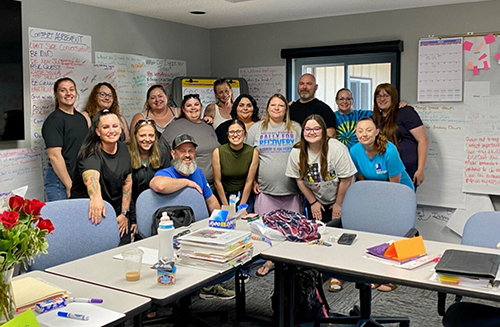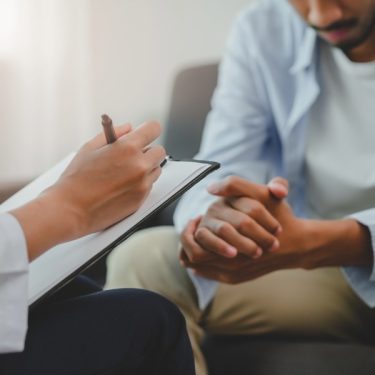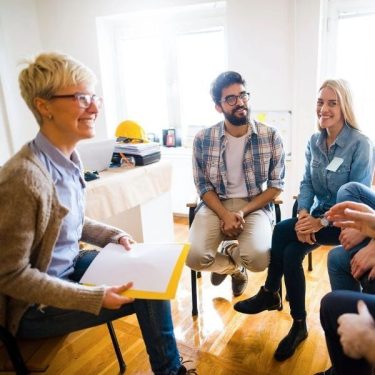It’s National Recovery Month, an opportunity to recognize the great work of organizations across the country and bring attention to best practices. We sat down with Sadie Thompson, CPSS, ALF WRAP — chief innovation officer at The Wellbeing Initiative Inc. — to learn how the National Council member organization is making a mark through the delivery of peer support services.
How is your organization helping people thrive?

“We empower people with mental health and substance use challenges, as well as chronic physical conditions, to reach their full potential. We cultivate communities by creating educational opportunities and advocacy trainings. In fact, we train 97% of the peer support specialists in Nebraska. We also offer peer support for substance use in county jails across 16 different counties and deliver trainings in 26 other states. We believe in community. Every direct service we provide is an opportunity to research how community and peer support impact people’s overall wellbeing.”
What do your trainings entail?
“We educate behavioral health organizations on how to integrate peer support services, and we provide a manual on how to shift the culture of organizations that provide peer support services, including supervising and managing this new service line. We lead our services through validated outcome tools, such as the recovery strengths and barriers survey and brief assessments of recovery capital, without using clinical assessments. We also offer whole-health peer support. For example, we have a center where people can attend cooking, Zumba, yoga and SMART classes, and individuals in rural communities are able to participate via Zoom.”
Do you have a success story you’d like to share?
“We had an individual come through who was struggling with substance use. He was in treatment and had other interventions, but he was excited about our peer support services.He w He worked with one of our peer support specialists and was greatly impacted by the relationship. He was so inspired that he enrolled in peer support training at a local community college, which integrated our curriculum into their program. He completed his practicum, demonstrating remarkable dedication.
“Now, he’s been a peer support specialist for six months, positively impacting the lives of others in recovery. This man, who had never held an adult job, is making a huge impact in the community. He’s also opening a whole new world to us by sharing his connections, allowing us to build new relationships.
“This is just one example of how our trainings help people make a significant difference in their communities. Each person who comes to our organization brings their own genius.”
What would people be surprised to learn about peer support?
“Peer support is a crucial service line that requires extensive training and a special kind of person. Not everyone in recovery makes a great peer support specialist. We must bring our own vulnerabilities every day, which is not a requirement for most other behavioral health providers, who typically maintain different professional boundaries and focus solely on helping others. Peer support involves sharing emotionally arduous experiences, requiring a unique type of person, a different type of professional boundary and significant training.”
What has your experience with peer recovery been like?
“I have a long history with behavioral health services, ever since I was 4 years old. No single relationship with a therapist or medication provider made the kind of difference that I found with someone who had been through similar experiences and come out on the other side. Hearing her story and seeing her become a positive member of society with strong relationships inspired me. I thought, if she could do it, I could do it, too. To come out of dark times and make your dreams come true, that’s an inspiration. And that inspiration is what drives us to show people that recovery is possible.”
What does recovery mean to you?
“It’s a lifelong journey, not merely a path toward wellbeing. It’s not about abstinence from something or the lack of any symptomology; it’s about consistently moving toward being the best version of ourselves. For some, this means accepting and loving who they are. For others, it may mean achieving significant life changes, such as holding down a job or becoming a leader within their current employment. Recovery is broadly defined but generally involves moving toward your own personal wellbeing as you define it.”
Is there anything you’d like to share with those in recovery?
“Life can be challenging, but there are others out there who have faced similar struggles and made it through. Despite the taboo surrounding mental health, more than half of us are impacted by it in some way. There is hope even if one pathway doesn’t work — try another. Recovery is not necessarily forever; it could be the key to opening doors to new opportunities and discovering new strengths. For every hardship, there is strength to be found. Lean into that strength and find a supportive guide who’s willing to walk you through it.”



